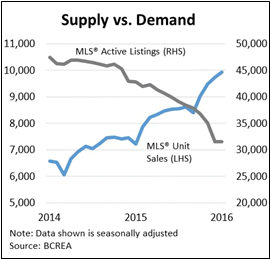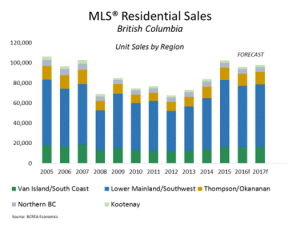BCREA Housing Market Update for February 2016
The BC Real Estate Association has released it’s latest Youtube video update. Economist Brendon Ogmundson discusses the January 2016 statistics.
MLS Listings, News & Statistics

British Columbia Real Estate News Stories And Articles
The BC Real Estate Association has released it’s latest Youtube video update. Economist Brendon Ogmundson discusses the January 2016 statistics.

The average MLS® residential price in the province was up 26.9 per cent year-over-year, to $752,906.
“The BC housing market continues to build on momentum from a very strong 2015,” said Brendon Ogmundson, BCREA Economist. “Heightened demand is being met with the lowest level of supply in a decade, resulting in increased pressure on prices in much of the province.”
The housing market has seen a blistering start to 2016, with housing demand supported by low mortgage rates and rising employment and wage growth in the province. However, MLS® residential sales are forecast to edge lower this year. Total MLS® sales last year were the third highest on record at 102,517. A record 106,310 residential unit sales were recorded in 2005, while the only other year eclipsing 2016 were 2007 when 102,805 unit sales were recorded.
Vancouver, BC – January 28, 2016. The British Columbia Real Estate Association (BCREA) released 2016 First Quarter Housing Forecast Update today.

Housing demand in the province is being supported by a relatively robust economy, leading to strong employment growth and rising wages. In addition, net interprovincial migration is on an upswing as many Albertans look to BC for job opportunities. BC home sales are forecast to remain well above the ten-year average of 83,200 units over the next two years.
“The inventory of homes for sale is now at its lowest level in almost a decade,” said Cameron Muir, BCREA Chief Economist. “Fewer homes for sale and strong consumer demand are expected to push home prices higher in most BC regions this year and in 2017.” The average MLS® residential price in the province is projected to increase 6.4 per cent to $677,200 this year and a further 4.1 per cent to $705,300 in 2017.
New home construction activity is expected to remain at elevated levels corresponding to strong consumer demand and relatively thin inventories, particularly on the South Coast. Total housing starts in the province are forecast to remain close to an annual pace of 30,000 units through 2017, which will be the strongest two year performance since the 2007-2008 period.
This article appeared on CBC.ca on January 15th, 2016.
Service industry and resource exporters stand to gain from low Canadian dollar

The Canadian dollar dropped again Friday to 68 cents US, fuelling concern that the growing downward momentum means tough times ahead for the country.
But some experts say B.C.’s diverse economy means enough sectors will benefit from the low loonie to boost the province’s outlook overall.
“One thing that really is emerging from the current environment is the fact that B.C. is doing relatively well precisely because we are more diversified,” said Ken Peacock, vice-president and chief economist at the Business Council of British Columbia.
“B.C. is doing very, very well, probably will lead the country this year in terms of economic growth.”
Here is a rundown of how economists think some of B.C.’s industries will fare in a low-loonie environment.
Service: tourism and film
Service industries like tourism and film are already feeling the benefits of a low Canadian dollar.
“Certainly in the services exports such as tourism, TV [and] film, the reaction is much more immediate,” said Helmut Pastrick, chief economist for Central 1 Credit Union.
Ski resorts like Whistler Blackcomb recorded 90,000 more visits for the fiscal year ending Jan. 3, 2016 than for the same time period the year before according to the company.
Those numbers are just the beginning of good times for B.C.’s $4 billion tourism industry says Tourism Vancouver.
“Now that [B.C.] is even greater value for those spending US dollars, we’re certainly expecting those numbers to go up in 2016,” said president and CEO, Ty Speer.
Real estate
Those hoping the low dollar will mean relief for B.C.’s high housing prices are in for disappointment, according to Peacock.
“The Americans will be looking to British Columbia, property prices, and say you know what, there’s a 30 per cent discount for us.”
Pastrick agrees, but adds that the impact of additional foreign interest may not make much of an impact.
“Most of the demand, the housing sales that we see are from local residents. So in that sense the market will not be impacted too much.”
Resources
Pastrick says the forestry industry in B.C. faces a mixed future. Demand for lumber will continue to climb, partially due to housing construction.
“U.S. housing starts will be higher this year and again in 2017,” he said adding that the outlook for softwood lumber exporters depends on agreement re-negotiations with the United States.
People in resources industries that rely on global demand may need to wait to see benefits, according to Pastrick.
But while coal and metal industries wait for big buyers like China to bounce back, Canada is still doing well.
“Canada is running a trade surplus for the last six to seven months,” said Pastrick “That too means the Canadian economy is somewhat stronger than is generally assumed.”